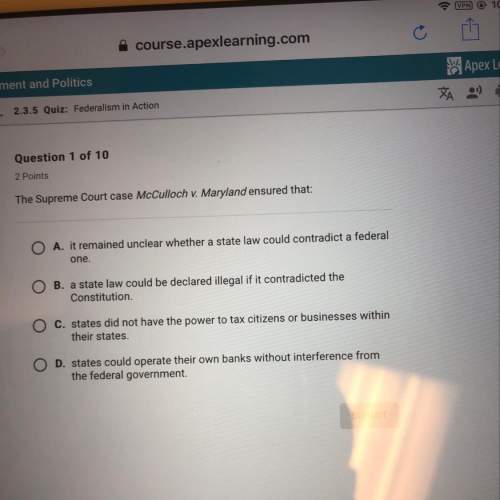All change
1. (04.01 MC)
George Washington once said, "We are one Nation today, and thirteen...

All change
1. (04.01 MC)
George Washington once said, "We are one Nation today, and thirteen tomorrow. Who will treat with us on such terms?" What did he mean by this statement? (1 point)
The states were arguing, and for Congress to attain power and the respect of other nations, they had to learn to compromise.
Each state was creating its own government system, and Washington was concerned that citizens would not be treated equally,
Other nations wanted the United States to divide into thirteen separate states, and George Washington wanted to discourage this idea.
Each of the thirteen states began creating its own trade laws, and this was creating confusion for nations who wanted to trade with the U. S.

Answers: 2


Other questions on the subject: History

History, 21.06.2019 14:30, davidmfox5890
Which amendment prohibits federal and state courts and federal administrative agencies from hearing cases in which a private party names a state as a defendant without the state's consent?
Answers: 1

History, 21.06.2019 15:30, AkramMasoud
Which of the following instruments has the largest pitch range? a. a conga drum b. a pipe organ c. a handbell d. a tenor's voice
Answers: 1

History, 22.06.2019 06:30, tabbywitherite84
Hich answer supports the statement, "the state constitution is more detailed than the u. s. constitution"? a) the u. s. constitution was created after state constitutions had been established. b) the u. s. constitution only exists because the state constitutions allowed it to be created. c) the articles in the state constitution do not deal with amendments like the u. s. constitution does. d) the articles in the state constitution deal with more specific issues than does the u. s. constitution.
Answers: 3
You know the right answer?
Questions in other subjects:


History, 13.11.2019 04:31











